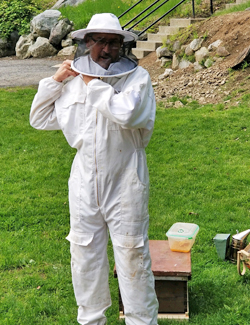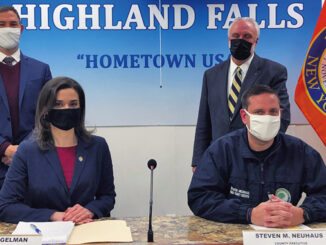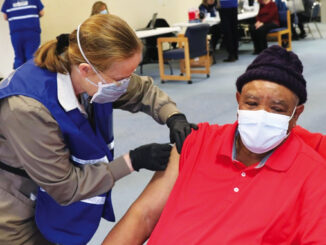
(Photo provided) – Highland Falls-Fort Montgomery Central School District Superintendent Dr. Frank Sheboy — former principal of Cornwall High School — is a beekeeper. He spent a recent spring afternoon talking about his craft to kindergarteners at the Fort Montgomery Elementary School.
GOSHEN — Now that warmer weather is here, Orange County Executive Steven Neuhaus encourages residents with bee problems to call a beekeeper to safely remove honey bees from their property and save the important insects.
According to the U.S. Department of Agriculture, honey bee populations face increasing risks from parasites, disease, lack of adequate nutrition and pesticide exposure.
“As a beekeeper, I know that honey bees play an important role in our environment,” Neuhaus said. “Our food supply would be greatly diminished without the pollination work done by bees and I appreciate residents being sensitive to these insects. We all need to do whatever we can do to preserve and protect honey bees as we are all dependent on them and their role as the great pollinator.”
Residents dealing with honey bees can call 911 to receive information about beekeeper resources available in Orange County. The websites honeybees911.com and sebcbees.com also have a list of beekeepers in the county. A beekeeper can safely gather and transport the bees from the residence or business, often for free.
Residents can visit the Cornell Cooperative Extension’s website (cce.orangecounty.org) for more information about honey bees, beekeeping and beekeepers.
Bees, butterflies and other wild insects are crucial for pollinating many crops essential to the human food supply. Experts say the dramatic drops in the bee population in recent years appear to be caused by a combination of pesticides and loss of habitat that has made pollinators more vulnerable to diseases and parasites. Pollinators, both wild and managed, are critical to food production worldwide. The annual value of insect pollination in New York State is estimated at $500 million. Some foods, such as tomatoes and blueberries, depend entirely on insects for pollination. Other crops, including sunflowers, green beans, raspberries, and blackberries, do not require pollination to reproduce, but benefit from better quality and yields when pollinators are involved.
“Honey bees and humans have enjoyed a symbiotic relationship over time,” said Lucy Joyce, executive director of the Cornell Cooperative Extension. “Farmers and gardeners depend on the honey bees to pollinate their crops. Cornell Cooperative Extension is pleased to work with County Executive Neuhaus to provide residents with the information needed to make responsible decisions regarding honey bee swarms and the removal of hives that are located inconveniently.”



